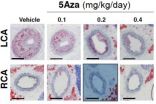(Press-News.org) Disturbed patterns of blood flow induce lasting epigenetic changes to genes in the cells that line blood vessels, and those changes contribute to atherosclerosis, researchers have found. The findings suggest why the protective effects of good blood flow patterns, which aerobic exercise promotes, can persist over time. An epigenetic change to DNA is a chemical modification that alters whether nearby genes are likely to be turned on or off, but not the letter-by-letter sequence itself.
The results are scheduled for publication in the Journal of Clinical Investigation.
Atherosclerosis is the buildup of fats and inflammatory cells in arteries, a process that can lead to heart attacks and strokes. The curvature of arteries and resulting disturbed flow influence where atherosclerotic plaques develop. Biomedical engineer Hanjoong Jo and his colleagues have developed a model that allows them to see the inflammatory effects of disturbed blood flow quickly. Jo is professor of biomedical engineering in the Wallace H. Coulter Department of Biomedical Engineering at Georgia Tech and Emory University.
"This new study shows that disturbed blood flow induces epigenetic changes that lead to atherosclerosis," Jo says. "It had been known for a long time that plaques preferentially develop in curved and branched arteries, but our lab has been able to prove that disturbed blood flow can actually trigger atherosclerosis, in the presence of risk factors such as high blood cholesterol."
Despite the demonstrated importance of blood flow patterns in atherosclerosis, it can be blocked in mouse models with a drug that interrupts the process of DNA methylation, an epigenetic change that often turns genes off. Jo's team has identified several genes that become turned off under disturbed flow conditions, in a way that requires DNA methylation. Some of these genes may represent new therapeutic targets in atherosclerosis.
The co-first authors of the JCI paper are biomedical engineering graduate students Jessilyn Dunn and Haiwei Qiu, and postdoc Soyeon Kim, PhD.
In the Jo lab's mouse model, researchers restrict blood flow in three carotid arteries on one side, in the presence of a high-fat diet. In a 2010 paper in Blood, they had found that one of the genes induced by disturbed blood flow is DNMT1, encoding a DNA methyltransferase enzyme.
DNMT1 carries out DNA methylation, an epigenetic modification of DNA. Changes in DNA methylation are important for cells differentiating into different tissues such as blood, muscle or bone, and for the development of cancer.
Dunn and her colleagues found that treatment with 5-aza-2'-deoxycytidine, a drug that is now used to treat acute myeloid leukemia, can prevent atherosclerotic plaques from forming in the mouse model.
"While we do not envision using 5-aza for atherosclerosis treatment clinically, our results do reveal potential therapeutic targets," Jo says.
A broader implication is that improving blood flow patterns, through aerobic exercise for example, can induce a lasting imprint on gene expression in the blood vessels, he says.
INFORMATION:
Disturbance in blood flow leads to epigenetic changes and atherosclerosis
DNA methylation critical in model of atherosclerosis
2014-05-28
ELSE PRESS RELEASES FROM THIS DATE:
Keeping active pays off even in your 70s and 80s
2014-05-28
Older people who undertake at least 25 minutes of moderate or vigorous exercise everyday need fewer prescriptions and are less likely to be admitted to hospital in an emergency, new research has revealed.
The findings, published in the journal PLOS ONE, reinforce the need for exercise programmes to help older people stay active. It could also reduce reliance on NHS services and potentially lead to cost savings.
In the first study of its kind looking at this age group, researchers from the University of Bristol looked at data from 213 people whose average age was 78.
Those ...
Endoscopic procedure does not reduce disability due to pain following gallbladder removal
2014-05-27
In certain patients with abdominal pain after gallbladder removal (cholecystectomy), undergoing an endoscopic procedure involving the bile and pancreatic ducts did not result in fewer days with disability due to pain, compared to a placebo treatment, according to a study in the May 28 issue of JAMA.
Post-cholecystectomy pain is a common clinical problem. More than 700,000 patients undergo cholecystectomy each year in the United States, and at least 10 percent are reported to have pain afterwards. Most of these patients have no significant abnormalities on imaging or ...
Study examines variation in cardiology practice guidelines over time
2014-05-27
An analysis of more than 600 class I (procedure/treatment should be performed/administered) American College of Cardiology/American Heart Association guideline recommendations published or revised since 1998 finds that about 80 percent were retained at the time of the next guideline revision, and that recommendations not supported by multiple randomized studies were more likely to be downgraded, reversed, or omitted, according to a study in the May 28 issue of JAMA.
As adherence to recommended clinical practice guidelines increasingly is used to measure performance, ...
Penn study: Longest-lasting cardiology guidelines built on findings of randomized controlled trials
2014-05-27
PHILADELPHIA –Clinical practice guideline recommendations related to screening and treatment can change markedly over time as new evidence about best practices and clinical outcomes of various treatments emerges. In a first-of-its-kind study, Penn Medicine researchers examined high-level recommendations published by the American College of Cardiology (ACC) and the American Heart Association (AHA) between 1998 and 2007 and found that recommendations which were supported by multiple randomized controlled trials were the most "durable" and least likely to change over time. ...
Citizens help researchers to challenge scientific theory
2014-05-27
Science crowdsourcing was used to disprove a widely held theory that "supertasters" owe their special sensitivity to bitter tastes to an usually high density of taste buds on their tongue, according to a study published in the open-access journal Frontiers in Integrative Neuroscience.
Supertasters are people who can detect and are extremely sensitive to phenylthiocarbamide and propylthiouracil, two compounds related to the bitter molecules in certain foods such as broccoli and kale. Supertasting has been used to explain why some people don't like spicy foods or "hoppy" ...
Study identifies risk of chemotherapy related hospitalization for eary-stage breast cancer patients
2014-05-27
Oncologists now have a new understanding of the toxicity levels of specific chemotherapy regimens used for women with early stage breast cancer, according to research from The University of Texas MD Anderson Cancer Center.
The retrospective study, published in the Journal of Clinical Oncology, used large population-based data to compare the risk of hospitalization for six common chemotherapy regimens. Reasons for hospitalization included infection, fever, anemia, dehydration, neutropenia (low white blood cell count), thrombocytopenia (low blood platelets) and delirium. ...
Quantity, not quality: Risk of sudden cardiac death tied to protein overproduction
2014-05-27
A genetic variant linked to sudden cardiac death leads to protein overproduction in heart cells, Johns Hopkins scientists report. Unlike many known disease-linked variants, this one lies not in a gene but in so-called noncoding DNA, a growing focus of disease research. The discovery, reported in the June 5 issue of The American Journal of Human Genetics, also adds to scientific understanding of the causes of sudden cardiac death and of possible ways to prevent it, the researchers say.
"Traditionally, geneticists have studied gene variants that cause disease by producing ...
FDA approves many drugs that predictably increase heart and stroke risk
2014-05-27
The agency charged to protect patients from dangerous drug side effects needs to be far more vigilant when it comes to medications that affect blood pressure.
Robert P. Blankfield, MD, MS, a clinical professor of family medicine, issues this call to the U.S. Food and Drug Administration (FDA) in an editorial published recently in an online edition of the Journal of Cardiovascular Pharmacology and Therapeutics; the print version of the article is expected to appear this autumn.
The editorial notes that several medications survived FDA scrutiny, only to be pulled from ...
JCI online ahead of print table of contents for May 27, 2014
2014-05-27
Disturbed blood flow induces epigenetic alterations to promote atherosclerosis
Arterial hardening, also known as atherosclerosis, is the result of plaque buildup in the walls of arteries and over time can lead to cardiovascular complications, including heart attack, stroke, and peripheral vascular disease. Atherosclerotic plaques typically develop in arterial regions with disrupted blood flow. While blood flow disturbances are known to alter endothelial gene expression and function, it is not clear how altered blood flow induces these changes in endothelial cells. In ...
Study finds climate change accelerates hybridization between native, invasive trout
2014-05-27
MISSOULA – A new article by researchers from the University of Montana, the U.S. Geological Survey and Montana Fish, Wildlife & Parks asserts that climate warming is increasing the hybridization of trout – interbreeding between native and non-native species – in the interior western United States.
Clint Muhlfeld, a research assistant professor in the UM Division of Biological Sciences' Flathead Lake Biological Station and research ecologist with the USGS Northern Rocky Mountain Science Center in Glacier National Park, is the lead author of the article, titled "Invasive ...
LAST 30 PRESS RELEASES:
Wiley to expand Advanced Portfolio
Invisible battery parts finally seen with pioneering technique
Tropical forests generate rainfall worth billions, study finds
A yeast enzyme helps human cells overcome mitochondrial defects
Bacteria frozen in ancient underground ice cave found to be resistant against 10 modern antibiotics
Rhododendron-derived drugs now made by bacteria
Admissions for child maltreatment decreased during first phase of COVID-19 pandemic, but ICU admissions increased later
Power in motion: transforming energy harvesting with gyroscopes
Ketamine high NOT related to treatment success for people with alcohol problems, study finds
1 in 6 Medicare beneficiaries depend on telehealth for key medical care
Maps can encourage home radon testing in the right settings
Exploring the link between hearing loss and cognitive decline
Machine learning tool can predict serious transplant complications months earlier
Prevalence of over-the-counter and prescription medication use in the US
US child mental health care need, unmet needs, and difficulty accessing services
Incidental rotator cuff abnormalities on magnetic resonance imaging
Sensing local fibers in pancreatic tumors, cancer cells ‘choose’ to either grow or tolerate treatment
Barriers to mental health care leave many children behind, new data cautions
Cancer and inflammation: immunologic interplay, translational advances, and clinical strategies
Bioactive polyphenolic compounds and in vitro anti-degenerative property-based pharmacological propensities of some promising germplasms of Amaranthus hypochondriacus L.
AI-powered companionship: PolyU interfaculty scholar harnesses music and empathetic speech in robots to combat loneliness
Antarctica sits above Earth’s strongest “gravity hole.” Now we know how it got that way
Haircare products made with botanicals protects strands, adds shine
Enhanced pulmonary nodule detection and classification using artificial intelligence on LIDC-IDRI data
Using NBA, study finds that pay differences among top performers can erode cooperation
Korea University, Stanford University, and IESGA launch Water Sustainability Index to combat ESG greenwashing
Molecular glue discovery: large scale instead of lucky strike
Insulin resistance predictor highlights cancer connection
Explaining next-generation solar cells
Slippery ions create a smoother path to blue energy
[Press-News.org] Disturbance in blood flow leads to epigenetic changes and atherosclerosisDNA methylation critical in model of atherosclerosis




